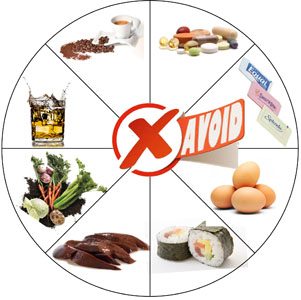
Foods to avoid during pregnancy
Every woman should consider a healthy lifestyle during pregnancy. A healthy lifestyle in pregnancy includes moderate physical activity, less stress, enough sleep, drinking plenty of water, and a proper pregnancy diet. But even a diet that is otherwise healthy can include foods, which are not good for a pregnant woman and her baby. When I was pregnant, I made a list of foods to avoid during pregnancy, and I hope it will help you too!
A pregnant woman should eat healthy, balanced, and diverse food, which is as fresh as possible. A diet rich in vitamins and minerals is essential for the pregnant woman and baby’s well-being, so her menu should be rich in fresh fruits and vegetables. But she needs to make sure that she gets enough healthy carbohydrates, proteins, and fatty acids too.
READ ALSO: Pregnancy diet in the first trimester
A list of foods to avoid during pregnancy
- raw or undercooked eggs
- soft cheese and non-pasteurized milk
- sushi and high mercury seafood
- raw or undercooked meat & poultry
- insufficiently washed vegetables
- liver
- alcohol, caffeine, and theine
- avoid vitamin supplements
- artificial sweeteners
Raw or undercooked eggs:
Potentially harmful are also all dishes from raw eggs (Caesar salad, homemade mayonnaise, Dutch sauce, homemade ice cream, etc.). You can eat boiled, baked eggs or ice cream that is pasteurized, so it does not increase the chances of salmonella.
Soft cheese and non-pasteurized milk:
Avoid eating soft cheeses, such as Brie, Gorgonzola, and other cheeses with noble mold. Also, do not use raw and non-pasteurized milk. As they are not pasteurized, they can cause listeriosis, infection with bacteria listeria.
Sushi and high mercury seafood:
It is good to avoid certain types of fish, such as sharks, swordfish, mackerel, and others that are considered to contain large quantities of mercury.
In this type of raw food, we generally find larger amounts of bacteria and viruses, as if they would be thermally treated. For pregnant women, it is better not to eat raw fish, especially shellfish, such as oysters.
RELATED: Sushi in pregnancy
Raw or undercooked meat & poultry:
Raw meat can increase the risk of salmonella and infection with bacteria that can cause toxoplasmosis. Lamb, pork, and game represent the highest risk of infection.
Insufficiently washed vegetables:
Make sure you rinse all vegetables thoroughly under running water before using it. There’s a small chance that vegetables coated with soil can carry the toxoplasma parasite. You could get toxoplasmosis, which is a mild infection for you but may harm your baby. It is a rare infection, but better be safe than sorry!
Liver:
Although livers have a lot of vitamin A and iron, doctors warn that pregnant women shouldn’t eat them in excessive amounts. Some studies have shown that eating livers during pregnancy can increase the chance of defects in newborns. Food and drug administration recommends pregnant women eat them only occasionally.
Alcohol, caffeine, and theine
Alcohol can affect premature birth, mental retardation, low birth weight, … Consume only small amounts of caffeine per day. You must be aware that drinking coffee is not the only possible source of caffeine. Caffeine is also in green, black, yellow and mate tea, guarana, chocolate, cocoa, and in various energy, and refreshing beverages.
Pregnant women should avoid vitamin supplements
Pregnant women should take about 100 mg of vitamin C per day. The advantage of using this vitamin is that we can’t “overdose” it because it is water-soluble and excreted in the urine.
For example, vitamin A is also important, but you should use it carefully! Excessive amounts of vitamin A cause damage to the fetus, therefore, we do recommend caution with vitamin A supplements.
It’s much better to get it with food. Vitamin A is in carrots, pumpkins, sweet potatoes, spinach, turnips, kale, salads, peppers, whole-milk dairy products, and oily fish.
Do not use artificial sweeteners in pregnancy!
Saccharin (Sweet ‘N Low) can cross the placenta and remain in fetal tissue, so it is strictly forbidden! Some other sweeteners are acceptable to some extent, but generally, they are not recommended. The same applies to excessive consumption of other sweet products, including sweet drinks.
